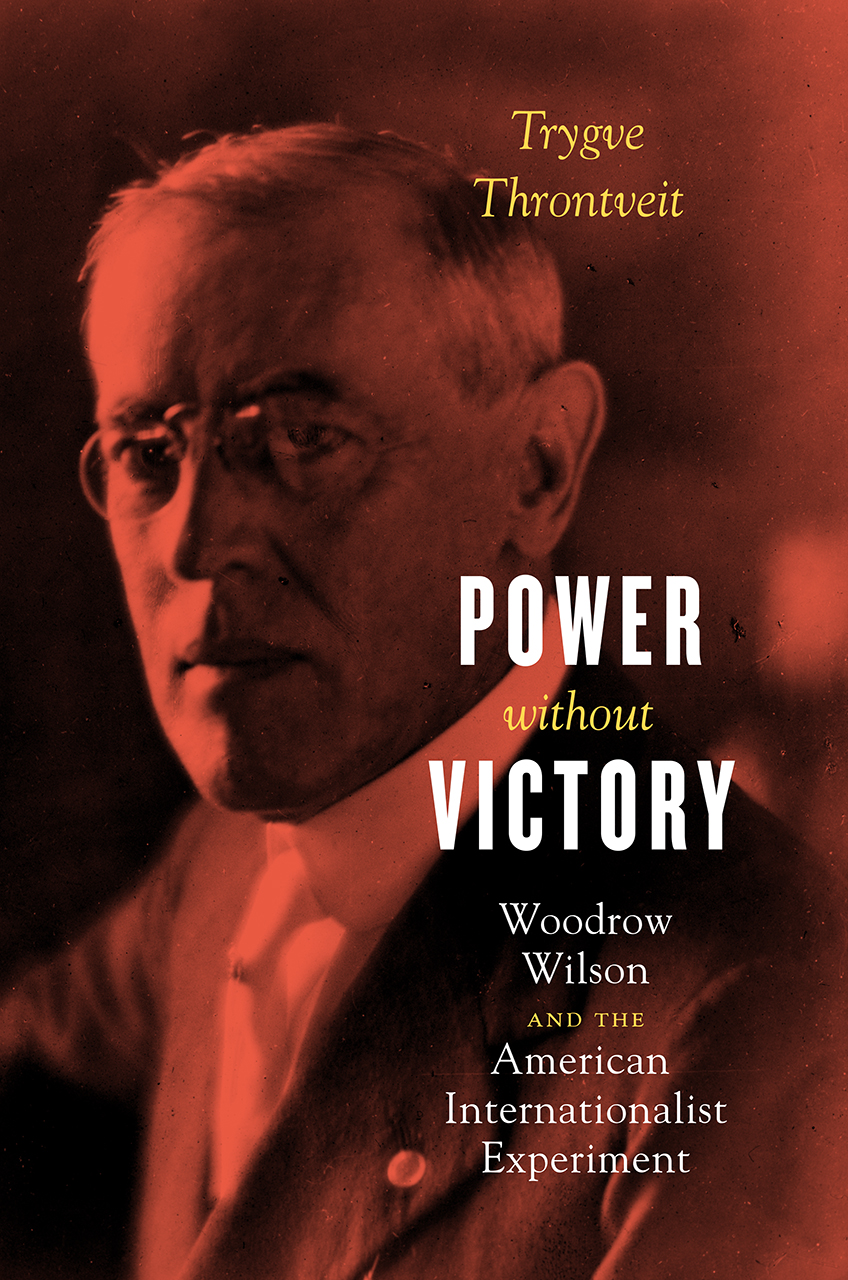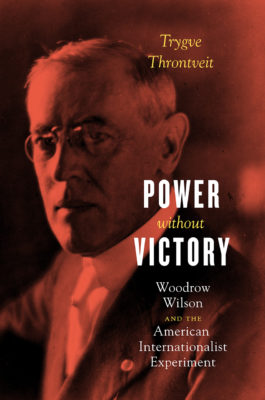Editor's Note
Cara Lea Burnidge is Associate Professor of Religion at the University of Northern Iowa. From her first book A Peaceful Conquest: Woodrow Wilson, Religion, and the New World Order (University of Chicago Press, 2016) to research essays like “US Foreign Relations and American Religious Liberalism” (Oxford Research Encyclopedia of Religion, 2017), Burnidge’s scholarship considers the relationship between liberal Protestantism and US politics in a global context. Currently, she is writing a religious biography of Elizabeth Cady Stanton, re-examining the intersections of Stanton’s engagement with the vibrant religious cultures of nineteenth-century America and the development of women’s rights movements.

It seems obvious to me why President Woodrow Wilson, and the time he served in office (1912-1920), fascinates historians. Wilson’s memory and legacy begs many to ask: Do we want to live in the image of America he created? For many historians, though, I think he invites special attention as the one and only Scholar President. Through his education and early career, he was one of us. He read profusely, taught undergraduates, and stood on the shoulders of giants as a researcher and writer. His liberal arts education, his devotion to American history, and his ingrained analytical habits, can make his mind a playground for puzzling out conceptual origins and influences.
 In Power without Victory, historian Trygve Throntveit presents a much needed piece of the Wilson puzzle, drawing attention to the influence of pragmatists on Wilson’s thought and examples of pragmatism in Wilson’s policy decisions to show how Wilson developed a “pragmatist internationalism.” Power Without Victory is a must-read for those interested in Wilson, in the intellectual life of the Progressive Era, or in the role of ideologies in the history of American foreign relations. Graduate students seeking to relate intellectual history to American foreign relations have much to learn from Throntveit’s example. He is careful and deliberate in the connections he makes between the invisible world of Wilson’s mind—his operating conceptual framework and the intellectuals who helped to shape it—and the visible manifestations in Wilson’s presidency, such as policy language in draft and final form, and reflections on Wilson’s actions given by his contemporaries and historians.
In Power without Victory, historian Trygve Throntveit presents a much needed piece of the Wilson puzzle, drawing attention to the influence of pragmatists on Wilson’s thought and examples of pragmatism in Wilson’s policy decisions to show how Wilson developed a “pragmatist internationalism.” Power Without Victory is a must-read for those interested in Wilson, in the intellectual life of the Progressive Era, or in the role of ideologies in the history of American foreign relations. Graduate students seeking to relate intellectual history to American foreign relations have much to learn from Throntveit’s example. He is careful and deliberate in the connections he makes between the invisible world of Wilson’s mind—his operating conceptual framework and the intellectuals who helped to shape it—and the visible manifestations in Wilson’s presidency, such as policy language in draft and final form, and reflections on Wilson’s actions given by his contemporaries and historians.
In the first chapter, Throntveit gives readers a master class in William James’s “ethical republic,” which he describes as “an ideal, of private and public interests converging” in the social experience of democracy. (p. 24). (This quote does not do justice to depth and nuance Throntveit provides. The entire chapter, “The Ethical Republic,” is an excellent primer on William James in general and this concept in particular.) He then highlights other, familiar iterations of pragmatism as concentric circles reverberating from James and influencing president Wilson: Jane Addams, for example, as a progressive and pacifist leader; John Dewey as a fellow graduate student at Johns Hopkins and a progressive; and W.E.B. Du Bois as a human rights advocate, who shifted between support and criticism of Wilson’s policies. The most vocal pragmatists in Wilson’s ear, though, were Walter Lippmann and Herbert Croly who, as editors and writers of the New Republic (and in Lippman’s case also as a policy advisor through the Inquiry), influenced Wilson, powerfully swaying him toward a particular kind of “internationalist experiment.”
The relative intangibility of “influence” as well as the constellation of people required to see Wilson’s pragmatist internationalism will likely frustrate some readers. For many diplomatic historians, ideologies (meaning, in this case, systems or patterns of thinking) will never have enough “force” to affect policy decisions or outcomes. Power Without Victory may be an exception to this “rule” because, I suspect, some readers may see ideals as more legitimate when part of an intellectual tradition—created for intellectuals by intellectuals—rather than as informed by religion, morals, utopian hopes or potentially non- or anti- “intellectual” figures. Since much of Throntveit’s case for Wilson’s pragmatist internationalism relies upon his comparisons between Wilson’s policy language and language found in pragmatists’ written works (rather than direct statements or notes from Wilson), these readers also may not be fully satisfied by the “influence” of pragmatism in American internationalism(s). To be clear, I used similar methods to study Wilson and his relationship to social Christians, so I am not one of these readers. I am considering how those “unconverted” by the importance of ideas in the history of American foreign relations may approach this work. For example, if readers want to pinpoint pragmatism and internationalism in the text, then the index directs readers to discussions of Croly and Lippman’s views, respectfully, not Wilson directly. This can be understandably frustrating when readers seek clearly defined thought processes and neat linear progressions from thought to policy outcome. Readers must be willing to buy the connections Throntveit makes between Croly, Lippman, and Wilson and find those shared impulses enough to classify Wilson a pragmatist.
In my reading, however, Throntveit’s primary interest is not to show how pragmatism caused Wilson’s internationalism per se, but rather to recalibrate our image of Wilson and Wilsonian internationalism away from vague “ideals” to a more intellectually grounded, deliberative approach to foreign relations. Shining a light on the development of American pragmatism and its place in Wilson’s intellectual development, then, is helpful because it clarifies his intellectual frameworks, and our thoughts of him in the process. To persuade readers away from long-held inaccuracies, Throntveit helpfully (and I think rightly) draws attention to the way realism (as a paradigm of international politics emerging in a particular historical context) clouds scholars’ ability to think historically about Wilson.
This method of clarifying the historical process and cultural contexts that produces specific ways of thinking, however, is not applied consistently across other formative ideological influences on Wilson. Most notably, Throntveit does not use the same level of historicism to our understanding of Wilson’s racism. Instead, he disambiguates Wilson’s “racism” from his “prejudice” and “white supremacy,” asserting a.) Wilson was a racist, b.) he held prejudice against African Americans, yet c.) he was not a white supremacist. [1] On these points, I am not convinced even as I appreciate the effort to make careful categorical distinctions. [2] Throntveit asserts, for example, “Wilson’s racial views were far from ‘white supremacist’” because “he was not that interested [in race]” but rather “economic backwardness”; and, because he did not sympathize with the Ku Klux Klan (even though, Throntveit grants, he could and did empathize with them). (p. 91) Little consideration is given the possibility that the language of “economic backwardness” could reflect as it also obscures white supremacy.
The differences between Throntveit’s understanding of Wilson’s racism and mine highlight what I see as the consistent frustration foreign relations historians and international relations scholars have with scholars focusing on the role of ideas: we connect the same dots of historical evidence yet produce different images. In contrast, I consider these analytical differences to be a source of intellectual history’s significance: the lack of direct cause and effect or monocausality and the vibrancy of peer review is a feature, not a bug. Throntveit and I agree Wilson was prejudiced against people of color and he was racist. It’s not a secret that Wilson imparted his prejudice and racism to his students and his daughters; he did not consider African Americans to be equal to Anglo-Americans in their intellectual capacities or role in society. Although he was less “determined” than others, he deliberately acted in ways that would maintain white superiority and black inferiority in law, education, social norms, and public life (I would include the times when he refused to act or delayed action alongside his policy decisions as significant examples). This, to my mind, gives a preponderance of evidence for “white supremacy.” I do not consider sympathy for the Ku Klux Klan a prerequisite or necessary qualification for Wilson’s white supremacy (or anyone else’s). Arguing so, does not place Wilson under a “pejorative umbrella” as Throntveit describes, because “white supremacy” need not be understood as a moral judgment on a person so much as an analytical category, an operating ideology, or a social system observed and sustained through evidence (especially when used by fellow credentialed historians). (p. 340n19) Even so, I think Throntveit and I arrive at a shared historiographical point even as we disagree about the logic and descriptors that get us there: there are distinctions to be made among white southern racists in particular and within U.S.-American racism more generally.
I raise this point because, for me, it casts a long shadow on the book’s assertions about Wilson’s connections to pragmatism and Wilson’s internationalism as specifically a pragmatist ideal. Framing Wilson’s racist domestic and foreign policies as “moral breakdowns” representing his “worst flaws rather than his best ideals,” allows these collective actions of prejudice and racism to be episodic rather than systematic; circumstantial moments rather than deliberate patterns; irrational accidents rather than rational intentions; and, deviations from rather than standards of Wilson’s intellectual (rather than moral) norm. (p. 87) This makes me wonder how Wilson, as a pragmatist, can be so systematic, deliberative, and contemplative about every other thing he thinks about, but not this? If other pragmatists were able to consider race relations in a systematic way, why couldn’t Wilson? And why did Wilson so consistently do racist things across his life and career if racism was a “flaw” rather than an ideal or norm to uphold? I suspect (perhaps predictably) it is because there were more fixed systems in Wilson’s intellectual life than Power Without Victory allows, namely white supremacy, white patriarchy, and white American Protestantism. I still see these ideological frames and their corresponding social, political, and cultural scaffolding holding the life of Wilson’s mind in place, even as he experiments with the details and contours within. Throntveit convinces me pragmatism is another element shaping Wilson and his approach to internationalism, but counter to the assertions in Power Without Victory I’m left thinking pragmatism ends up reinforcing the racism of Wilson’s deliberative democratic process by providing the respectability of intellectualism.
Notes
[1] Readers are referred to 4 sections: the first is in the introduction where Wilson’s pragmatist internationalism is introduced; the second, is to a discussion of Croly’s pragmatist internationalism; the third, to Lippman’s; and the fourth is in the conclusion as the summation of Wilson’s pragmatist internationalism.
[2] I see parallels in these delineations of “racist,” “racism,” “prejudice,” and “white supremacy” with current public debates about delineating “sexual assault,” “rape,” “harassment,” and a “bad date” in so far as we can agree that distinctions matter while also disagreeing on how and why particular legal and cultural distinctions are made.

0